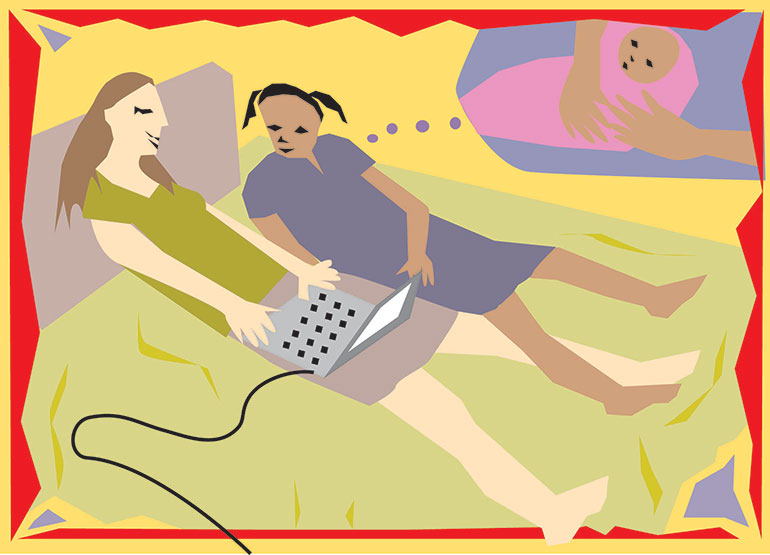My 10-year-old daughter sat down next to me on my bed, flopping a dark leg across one of my light ones. My laptop was on my lap, and early evening light shone through the curtains and onto the screen as I typed the name of my daughter’s birth mother into Google.
An hour or so earlier, we’d been eating dinner. My daughter was using her fork to carefully separate the foods on her plate so that they didn’t touch. Suddenly she looked up and asked, “Can I Google my birth parents?”
The question caught me off guard. In the eight years since she’d arrived as a two-year-old foster child, she’d rarely asked much at all about her birth parents. The adoption process had taken awhile, but, by the time I signed the papers that made her adoption official, my little girl had been calling me Mommy for nearly two years.
Two weeks before, she and I had spent five days at a camp for adopted children of color and their families. This was her first experience — and mine, too — of being around many families like ours, white parents with adopted black children.
While our kids participated in the usual summer camp activities, we adoptive parents engaged in talks about the politics of adoption, the importance of good-looking hair for black women, and the psychological effects of abandonment. Some of the speakers, transracially adopted themselves, stressed the importance of keeping our children connected to their birth culture, if not to the parents who relinquished them (willingly or not) for adoption. As a single mom who became a foster parent to make a difference in children’s lives, I hadn’t anticipated falling in love with and adopting my first foster child, but that’s what happened.
My daughter has hazy memories of being homeless with her birth mother. At the time when my daughter was put into foster care, her mother had supposedly been “on the lam.” The mother’s parental rights were terminated not long afterward, as were the father’s. I never met either parent. Our adoption caseworker suggested that a closed adoption would be best.
Now, years later, the rhythm of our daily lives — school, soccer practice, play-dates, sibling squabbles (I have a teenage son, too) — mirrors that of almost any “normal” family around.
At the dinner table, I looked at my daughter before I spoke. I decided her recent experience at the camp must have awakened a curiosity about the parents she barely remembers.
“We can Google them after the dishes are washed,” I said, emphasizing the “we.” This was an experience I wanted to share with her. Was it really possible that we could find something about her birth parents online? I told my daughter I’d support her if she wants to try to locate them after her eighteenth birthday. I had doubts about finding anything by Googling their names, but now I was curious.
After we did the dishes, we settled down on my bed and I typed her birth mother’s name into Google. Nothing that came up suggested anything to do with a youngish black woman.
“Let’s try my dad,” said my daughter.
I typed her birth father’s name and, right away, an archived news article came up. We read it together, my daughter stone-faced.
“Are you sure it’s him?” she asked, when she reached the bottom of the page. Of course, I wasn’t about to lie to her. The geography, the age, the race — the details based on what little I knew of his past from our adoption caseworker — left no question in my mind. The crime he committed isn’t important to relate here. He’s locked up. He may be for a while.
What is important is the fact that I held onto my daughter for a long time after we finished reading the article. And I held her long after I asked how she felt. Her one word answer was, “Disappointed.”
“I’m disappointed, too,” I told her, and reminded her of how much I loved her. I told her that, any time she wants to see the few baby pictures of her with her birth parents, taken before things fell apart in their lives — she only has to ask me.
My daughter’s somber mood didn’t last long — she’s amazingly resilient. By the next evening, she was, as usual, pushing her mashed potatoes away from her chicken, and her green beans as far away from both of them as possible.
I reflected on the symbolism of this nightly routine. She’s separating her past from her present, I thought. She’s not about to let the pain of her past touch her. Not now, anyway. For now, she’s got soccer games to play, homework to complete, friends to play with, an eleventh birthday party to plan, and a mom and big brother to love and hang out with. Her birth parents would be proud to see how well she’s doing. I hope some day they’ll know.



